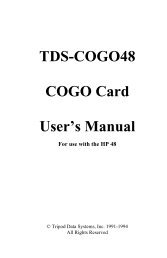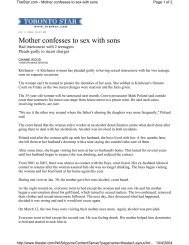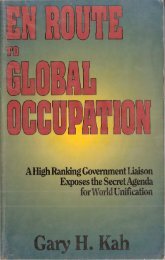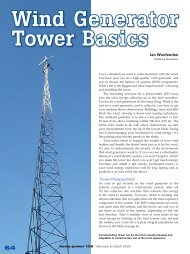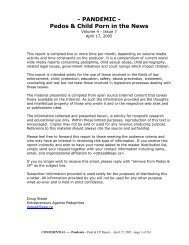G. Edward Griffin - The Fearful Master - PDF Archive
G. Edward Griffin - The Fearful Master - PDF Archive
G. Edward Griffin - The Fearful Master - PDF Archive
You also want an ePaper? Increase the reach of your titles
YUMPU automatically turns print PDFs into web optimized ePapers that Google loves.
from an executive agreement, a higher source than Congress, and, as such, must be<br />
supported. 14<br />
Some Americans, as they see their country gradually becoming more and more helplessly<br />
ensnared in this web of foreign entanglements, seek comfort in the thought that the real<br />
power of the United Nations supposedly resides in the Security Council where we have<br />
the right to veto anything that we dislike. As long as this is so, they reason, we have<br />
nothing to fear. But these people are in for a rude awakening. For one thing, as we have<br />
already pointed out, the Secretariat or full-time staff of the UN wields a dominant influence<br />
amounting to virtual effective control from behind the scenes. Aside from that, however,<br />
thinking strictly in terms of the theoretical power structure, it is true that the original setup<br />
was supposed to place the authority to wage war and other important matters in the hands<br />
of the Big Five in the Securitv Council, each with the protection of a veto. <strong>The</strong> General<br />
Assembly was supposed to be merely a world forum where nations could express their<br />
views and pass harmless resolutions. In fact, it is doubtful that the American people would<br />
have accepted the United Nations on any other basis. But the UN Charter is a remarkable<br />
document and, as we shall see, things are not quite the same today as they were in 1945.<br />
As Secretary of State John Foster Dulles put it:<br />
If a situation is arrived at where you can't accomplish a reasonable fair<br />
result through technical Charter amendments, it may very well be<br />
possible to agree on procedures which would get a very large part of the<br />
desired result. Now it would be much neater and cleaner to do it by<br />
Charter amendment, but if that process is frustrated by the fact that the<br />
five permanent members have the veto power on amendments, then<br />
other ways could be found. [Italics added.]<br />
He said that the United Nations Charter was sufficiently unspecific and flexible to allow<br />
evolution in this direction, and concluded that, for this reason "future generations would be<br />
thankful to the men at San Francisco who had drafted it." 15 Trygve Lie expressed the<br />
same sentiment when he said:<br />
. . . there has been a healthy shift in power from the council to the vetofree<br />
General Assembly Thus, progress by no means alone depends<br />
upon textual revisions of the Charter. A continued liberal construction of<br />
the Charter we now have holds out great promise, and perhaps is the<br />
more practical way to strengthen the bonds of the world community. 16<br />
This philosophy, of course, is not original with Mr. Dulles or Mr. Lie. Centuries earlier<br />
Napoleon wrote: "A constitution should be short and obscure." While the United Nations<br />
Charter is anything but short, it certainly is obscure. A smart politician with a flair for legal<br />
language could justify almost anything on the basis of its provisions. As Dulles admitted: "I<br />
have never seen any proposal made for collective security with 'teeth' in it, or for 'world<br />
government' or for 'world federation,' which could not be carried out either by the United<br />
Nations or under the United Nations Charter." 17<br />
What has all this got to do with our veto in the UN? Simply this: We do not have it any<br />
more! When the United Nations called for military action to repel the Communist invasion<br />
of South Korea, technically speaking it was violating the terms of its own Charter. This has<br />
never slowed the UN down in the past, but this time the issue was important enough to<br />
demand the pretense of legality. <strong>The</strong> difficulty arose due to the Soviet's absence from the<br />
Security Council. When the United Nations was formed, it was understood that a Big Five


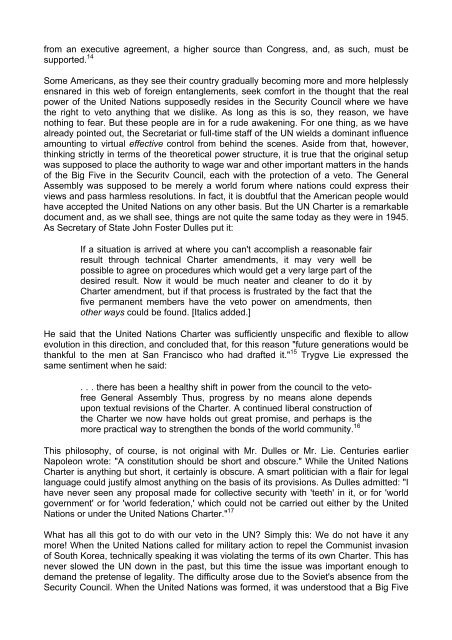
![Robert T McQuaid [rtmq@stn.net] Sent: Friday, October 29, 2004 12 ...](https://img.yumpu.com/51070071/1/190x245/robert-t-mcquaid-rtmqstnnet-sent-friday-october-29-2004-12-.jpg?quality=85)

